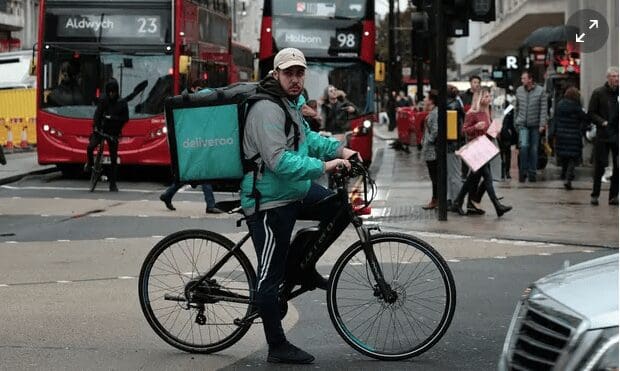Far from providing flexible jobs for complex modern lives, gig economy companies, such as Uber and Deliveroo, increasingly trap workers in a precarious existence where they need to devote ever-more time to the platform in order to remain financially stable, a new report argues.
Based on research and collaboration with a group of gig workers, the report by digital thinktank Doteveryone argues that the spiral can be reversed by government action – or by the platforms themselves adopting changes, which could be implemented rapidly.
“The platform economy enables flexible work but not everyone benefits equally,” said Catherine Miller, interim chief executive officer of Doteveryone. “The recommendations set out in this report can happen immediately and show that, in shaping the future of work, technology can and should be used responsibly to create a fair, inclusive and sustainable democratic society.”
The problems identified by the thinktank fall into three categories: a lack of financial security, a loss of dignity at work, and the inability to progress in a career or train to leave it.
When it comes to finances, for instance, workers highlight that the low rates of pay mean flexibility is often moot because the only way to earn enough to live is to work longer than full-time. “If you want to get the money you’ve got to be available seven days a week,” said a London-based handyman.
Working for any of the platforms carries hidden costs, the report details. One Uber driver says: “I do 60 hours, I make £750. But then you have to deduct expenses, around £150 on fuel. I can take out £600 but then you pay insurance, VAT for cars. It’s been four weeks where I’ve made no more than £400. You’re just managing your expenses and taking £150-£200 home.”
“I did in the beginning write emails – long emails – pointing out ways the platform could work better for [workers],” the report quotes a 22-year-old courier for a delivery platform as saying. “But I realised that they don’t care about that. If you make any issues for them, they’ll just fire you or find a way to stop giving you work.”
Wasted knowledge plays into the third problem: an inability to see a way out of the flexible life. “I don’t know what comes next as I can’t keep working [gigs] as I can’t get a new car when this one dies,” said a 42-year-old driver from Stoke-on-Trent. “And I don’t have time [to research alternative careers] or go to the gym – sometimes I’m sitting here waiting for a job for an hour and a half!”
To tackle these problems, Doteveryone suggests three key policies that could improve life for workers: a minimum gig wage, which would require platforms to account for the additional costs that are levied on the workers, such as fuel costs for drivers and statutory employee benefits; modifications to the government’s national retraining scheme, to make it easier for “flexible” workers to take advantage of the courses on offer; and the introduction of new governance structures at gig employers to give workers a greater voice in the design of the platforms.
But there are also solutions the gig employers themselves could offer: rather than display earnings in a way designed to “nudge” drivers to further work, for instance, Uber could clearly state income per hour, and allow drivers to track their expenses to get a true picture of how much any additional job would earn them.





















